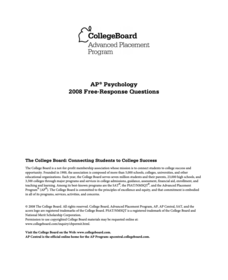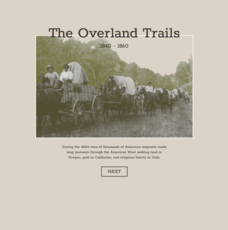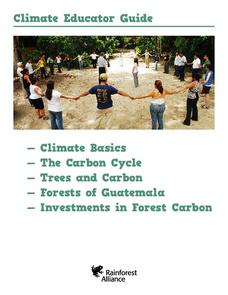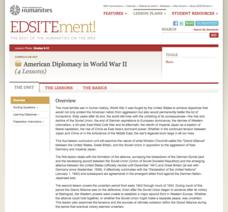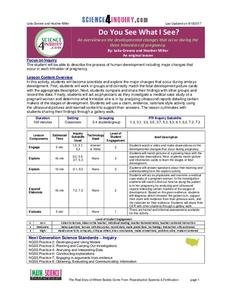Howard Hughes Medical Institute
Ebola: Disease Detectives
How did the Ebola virus first infect humans? Young virologists examine genetic sequences from the 2014 Sierra Leone outbreak to find similarities during a riveting activity. Following similar methods used by MIT and Harvard, partners...
Howard Hughes Medical Institute
Paleoclimate: A History of Change
Earth's climate changed drastically throughout the history of the planet, so why do scientists blame humans for recent changes? Observe data covering the history of the planet that proves the natural climate change patterns. Then, learn...
Population Connection
A Demographically Divided World
Did you know that birth and life rates vary across the world? The resource, the second in a six-part series, discusses just how demographics differ across countries and why it might be the case. Scholars complete worksheets, watch...
Echoes & Reflections
The Children and Legacies Beyond the Holocaust
Using video testimony, primary source documents that detail international agreements, and structured discussions, learners consider the precarious position of children during the Holocaust and other international conflicts, and how to...
University of Richmond
Foreign-Born Population 1850-2010
If America is a nation of immigrants, where are they from and why did they come? Demographic data and interactive maps help pupils consider answers to these questions by examining the statistics of foreign-born Americans. Features allow...
Council for Economic Education
The Economics of Income: If You’re So Smart, Why Aren't You Rich?
If basketball players make more than teachers, why shouldn't learners all aspire to play in the NBA? Unraveling the cost and benefits of education and future economic success can be tricky. Economic data, real-life cases, and some...
WindWise Education
Can We Reduce Risk to Bats?
It is just batty! A resource outlines a case study scenario of reducing the risk to bats. Teams learn about the bat populations in the area of the wind farm, then research and propose a solution.
Council for Economic Education
Athens and Sparta-Imagine the Possibilities
Both Athens and Sparta made choices to survive in ancient Greece. Those choices were, in essence, economic ones about how to direct resources. A Venn diagram activity and reading ask class members to examine the connection between...
Council for Economic Education
Wages and the Black Death
While the Black Death wiped out a third of Europe's population during the Middle Ages, its destruction paved the way for better wages for workers and even an early form of modern capitalism. The relationship between the cataclysmic event...
Council for Economic Education
The Columbian Exchange
What did you have for dinner last night? Many scholars ask that question without considering the history behind the foods they eat. Using a simulation, scholars investigate how the foods they eat are the product of the Columbian...
National Constitution Center
Explore Rights Around the World
How has the American Bill of Rights influenced the rest of the world? An interactive web activity helps individuals see the similarities between countries' bills of rights. A text-to-text tool compares the American Bill of Rights to...
College Board
2018 AP® United States History Free-Response Questions
Learners explore the the Age of Imperialism using primary sources and an authentic College Board documents-based question. Other prompts explore the economic changes brought about by the American Civil War, technology, mercantilism, and...
College Board
2008 AP® Psychology Free-Response Questions
Parenting can befuddle new moms and dads, but psychology helps! Learners explain various theories of parenting and child development using a case-study model and materials from College Board. A second practice question asks scholars to...
University of Richmond
The Overland Trails 1840-1860
What led Americans to head west in the 1800s? Using an interactive map and journals from those who traveled, pupils explore the stories of those who migrated. In addition, they see how the numbers fluctuated in response to the push-pull...
National Woman's History Museum
Eleanor Roosevelt: An Agent of Social Change
First ladies often take a back seat to their husbands' policies, but Eleanor Roosevelt broke that mold. Interested historians examine primary sources written by Roosevelt, including a speech and articles. Completing a round-robin of...
Nature Works Everywhere
Recording the Rainforest
Animals have evolved to communicate in different frequencies so they can hear each other throughout the rainforest. The first instructional activity in a three-part series begins by exploring an interactive story map online about the...
Beyond Benign
Medical Ethics
Just because we have the ability to determine an organism's traits through genetic testing, should we do it? Middle-school medical experts examine the ethical dilemmas in biotechnology in the 18th and final installment in a series of...
Cold Spring Harbor Laboratory
Living Things Share Common Genes
Everything evolved from a common ancestor, but how did modern plants and animals develop so many more genes? Scholars use an online interactive to learn about the process. They begin to understand common genes with an animation, multiple...
Rainforest Alliance
Climate Educator Guide
Climate change is a hot topic in the news. Class members examine carbon dioxide data to analyze trends of our atmospheric makeup over time. They also discuss climate and climate change, and determine how these changes are affecting life...
Cornell University
Fibers, Dyes, and the Environment
Nanofibers can be made through electrospinning or force spinning in order to reduce the negative impact on the environment. Pupils study the role of fibers and dye on the environment through a series of five hands-on activities. Then,...
National Endowment for the Humanities
American Diplocmacy in World War II
The end of World War II saw the world deeply changed over the last few years. Four thorough lessons explore post-war Europe, America, and Asia through reading assignments and discussion questions about the Grand Alliance and the signing...
Science 4 Inquiry
Do You See What I See?
In only nine months, a small group of cells grows into a fully developed baby. Pupils learn about the development of an embryo to a fetus to a baby. They identify each step of weekly development. Young scientists look at ultrasounds to...
San Antonio Independent School District
Breaking Down the Declaration of Independence
Are learners heavy sighing at the idea of reading a primary source, written in a language that is difficult to understand and in cursive? Look no further, because the resource breaks down the Declaration of Independence in an...
Advocates for Human Rights
The Right to a Clean Environment: Water
First, young citizens learn about water consumption by doing some research themselves on their home water usage and sharing their findings with the class. Then, they do some brainstorming and devise a plan to reduce water consumption.
Other popular searches
- Arts and Humanities
- Humanities and Music
- Humanities and Culture
- Art and Humanities
- Integrated Humanities
- What Are the Humanities
- Humanities Humanities
- Humanities Ancient Greece
- Humanities Africa
- Arts Humanities
- Arts; Humanities
- Primary Humanities














